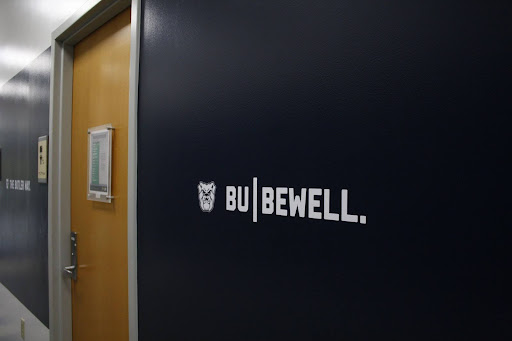Butler University’s Counseling and Consultation Services partnered with The Compass Center to provide mental and spiritual well-being resources to students and faculty surrounding election week. Photo by Katerina Anderson.
RACHEL JOYCE | STAFF REPORTER | rljoyce@butler.edu
As Americans braced themselves for the U.S. elections, polarized opinions, harsh media coverage and the uncertainty of the future risked overshadowing personal well-being. The intensity of political outcomes can push aside mental health, causing students to feel suffocated by the tension of this important season.
First-year exploratory studies major Haydan Gabbard reflected on the stress students often experience as new voters.
“For a lot of college students, this is our first time voting, especially in a presidential election,” Gabbard said. “So a lot of people are feeling the new weight of having the power to do something with their [voices] … which definitely [creates] stress.”
Civic responsibility can motivate students to become engaged in the democratic process, but the gravity of the decisions being made can make many feel lost when navigating the political landscape. The sheer volume of news filtered through biased mainstream lenses strips away clarity, making it difficult to feel properly informed.
These outpourings of political discourse also add to the anxiety of sharing political convictions. This reality highlights the need for education and support among all who are affected by current political climates, especially those who are less experienced.
“I think that [having ways to] validate and rationalize some of the feelings that we might be having is really [important],” Gabbard said. “[It helps us remember] that, at a certain point, [the election] is not in our hands, and we can only move forward from whatever happens.”
Butler University’s Counseling and Consultation Services (CCS) partnered with The Compass Center (TCC) to provide mental and spiritual well-being resources to students and faculty surrounding election week. Both organizations are offering supportive, non-partisan spaces through their events.
On Nov. 5, tabling outside of Butler’s on-campus Starbucks was provided from 2-4 p.m. Students had opportunities to reflect on election day, staying mindful of their feelings through conversations and writing prompts that encouraged them to identify points of anxiety and joy in their lives, explore hopes and fears for the future and document personal coping strategies. Each also had the chance to learn about the upcoming drop-in spaces offered by CCS and TCC.
On Nov. 6 and 12, CCS and TCC will offer drop-in support from 6-8 p.m. in Atherton Union 326. There will also be opportunities for one-on-one conversations with licensed professionals to create space for the emotions surrounding the week. Snacks, journaling prompts and crafts will be provided, as well as chances to pet therapy dogs while processing the election’s results.
Dr. Casiana Warfield, assistant director of Counseling and Consultation Services, intends to help others rediscover hope through these events.
“Personally, my biggest goal is to connect people to what is meaningful to them, regardless of what happens externally,” Warfield said. “I really want people to walk away with some hope for the future.”
Hope becomes scarce when times are burdened with uncertainty. Environments that bring people together while fostering reassuring interactions allow many to find faith in the future once again; they serve as a reminder that connection is stronger than political factors, building foundations of trust in those nearby that outlive any sense of anxiety or disconnect.
“It’s important to have difficult conversations, to talk about issues and to advocate for things that matter to you,” Warfield said. “But, during a time of high stress, it’s sometimes more important to find community.”
Daniel Meyers, director of The Compass Center, plans to build a supportive environment within the events for the multitude of political perspectives on campus.
“We know [Butler] is diverse politically and that people may be leaning towards all kinds of directions in the different [possible scenarios],” Meyers said. “We’re trying to offer, in the support spaces … a sense of purpose … [and an understanding of] what our roles are in this democracy beyond the vote … whichever direction [each of us may lean].”
Understanding personal beliefs goes beyond political affiliation. Many opinions, such as thoughts on ethics, religion and human rights, cross political lines, falling under one’s personal morality and culture. Taking time to process one’s civic engagement on a more introspective level while discovering possible next steps can provide students and faculty with the spirit to continue engaging in democratic processes.
“[American politics] have taken on a personalized sort of nature,” Meyers said. “It’s not only about politics anymore; it’s about one’s identity.”
Political beliefs are often viewed as an extension of who we are. Engaging in democracy not just as citizens but as representatives of individual identities is important. However, doing so without a support system can lead to diminished well-being from burnout and isolation.
The non-partisan resources offered by CCS and TCC allow the Butler community to rediscover confidence in themselves and their actions in times of intense nationwide change. Through crafts, conversations or personal reflection, these support spaces offer healing that will inspire students and faculty to look towards the future with hope, moving past the uncertainty tied to political outcomes with a mindset that invites fellowship and care for well-being.
Updates and information about these events can be found on CCS’s Instagram page.



